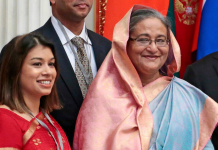WASHINGTON, DC: APR 23 (DNA):The Embassy of Pakistan in Washington DC hosted a landmark economic dialogue on the sidelines of the IMF and World Bank Spring Meetings, bringing together Pakistan’s economic leadership, global financial institutions, and corporate representatives from the United States.
The event showcased Pakistan’s remarkable economic turnaround and its potential as a global investment destination. Finance Minister Senator Muhammad Aurangzeb, in his keynote address, emphasized the pivotal role of the private sector in driving Pakistan’s economic future, stating that the government’s role was to provide policy frameworks and ensure continuity.
He described this shift as a “mindset and societal change,” likening it to the transformative impact of artificial intelligence. Engaging in a candid dialogue, the Finance Minister addressed questions related to the ease of doing business and reiterated the Government’s unwavering commitment to the reform process.
He identified population growth and climate change as two major existential issues, calling for private-sector collaboration on investable projects, leveraging available financing and technical expertise. He reaffirmed the Prime Minister’s vision of running Pakistan as “Pakistan Inc.” with the government acting as public servants to facilitate investors.
Ambassador Rizwan Saeed Sheikh, in his welcome remarks, highlighted Pakistan’s geostrategic and geo-economic significance as a market of 250 million people and a gateway to Central Asia, China, the GCC, and Afro-Asian regions.
He also showcased the country’s economic performance, as acknowledged at the IMF-World Bank forums, and underlined Pakistan’s strengths in the IT sector and mineral resources. He announced plans for recurring events to strengthen U.S.-Pakistan business ties. “As Pakistan’s Chief Marketing Officer, I invite you to profit from the promise of Pakistan,” he added. Mr. Amir Ibrahim, CEO of Jazz, Pakistan’s largest cellular provider, lauded the country’s economic stabilization over the past 15 months.
He urged optimism, noting Jazz’s transformation into a digital services platform reaching over 100 million users. He stressed the importance of inclusive digital infrastructure and working with regulators to democratize access to technology. Mr. Christos Harpantidis, Vice President External Affairs at Philip Morris, acknowledged the company’s $800 million investment in Pakistan and shared plans to expand further.
He attributed this decision to economic stability, controlled inflation, and exchange rate predictability. Mr. Husnain Aslam, CEO of TRG, highlighted the global footprint of his IT holding company employing 35,000 individuals, including 9,000 in Pakistan.
He supported the Prime Minister’s goal of scaling IT exports from $3 billion to $25–30 billion, citing Pakistan’s telecom infrastructure and young talent pool. Mr. Martin Raiser, World Bank Vice President for South Asia, commended Pakistan’s economic turnaround driven by fiscal, energy, and exchange rate reforms.
He underscored the need for increased investment and growth, and reaffirmed the World Bank’s support through its 10-year, $40 billion Country Partnership Framework. Mr. Bahadur Bijani, Executive Director at the IMF, praised Pakistan’s policy consistency and leadership, acknowledging record-low inflation and currency stabilization.
He emphasized the importance of protecting these hard-earned gains and lauded the leadership of Finance Minister Aurangzeb, Governor Jameel Ahmad, and Prime Minister Shehbaz Sharif. Mr. Charles Freeman, Senior Vice President for Asia at the U.S. Chamber of Commerce, announced the upcoming visit of a U.S. Chamber and U.S.-Pakistan Business Council delegation to Pakistan—the first in seven years. He praised Pakistan’s renewed stability, transparency, and predictability. Later, the Finance Minister interacted with corporate leaders and addressed their queries regarding Pakistan’s investment potential.

















